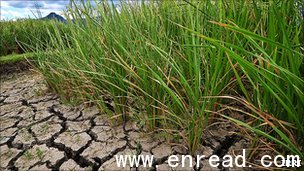| ||||||||||||||||||||||||||||||||||||||||||||||||
|
Global warming is cutting rice yields in many parts of Asia, according to research. 调查显示,全球变暖导致亚洲许多地区水稻产量下降。  Warmer climates will bring changes to rainfall, potentially causing drought Yields have fallen by 10-20% over the last 25 years in some locations. The group of mainly US-based scientists studied records from 227 farms in six important rice-producing countries such as Thailand, Vietnam, India and China. This is the latest in a line of studies to suggest that climate change will make it harder to feed the world's growing population by cutting yields. In 2004, other researchers found that rice yields in the Philippines were dropping by 10% for every 1C increase in night-time temperature. That finding, like others, came from experiments on a research station. The latest data, by contrast, comes from working, fully-irrigated farms that grow "green revolution" crops, and span the rice-growing lands of Asia from the Indian state of Tamil Nadu to the outskirts1(市郊,郊区) of Shanghai. Describing the findings, which are published in Proceedings2 of the National Academy of Sciences (PNAS), lead researcher Jarrod Welch said: "We found that as the daily minimum temperature increases, or as nights get hotter, rice yields drop." The mechanism3 involved is not clear but may involve rice plants having to respire more during warm nights, so expending4 more energy, without being able to photosynthesise(光合作用) . By contrast, higher temperatures during the day were related to higher yields; but the effect was less than the yield-reducing impact of warmer nights. However, if temperatures continue to rise as computer models of climate project, Mr Welch says hotter days will eventually begin to bring yields down. "We see a benefit of [higher] daytime temperatures principally because we haven't seen a scenario5 where daytime temperatures cross over a threshold(门槛,极限) where they'd stop benefiting yields and start reducing them," he told BBC News. "There have been some recent studies on US crops, in particular corn, that showed the drop-off after that threshold is substantial," said the University of California at San Diego researcher. The 2007 assessment6 of climate impacts from the Intergovernmental Panel on Climate Change (IPCC) concluded that although a modest temperature rise could increase crop yields in some regions, for "temperature increases more than 3C, average impacts are stressful to all crops assessed and to all regions". A study published at the begining of last year concluded that half of the world's population could face a climate-induced food crisis by 2100, with the most extreme summers of the last century becoming routine towards the end of this century. 点击  收听单词发音 收听单词发音
|
||||||||||||||||||||||||||||||||||||||||||||||||
上一篇:英国男性最关心头发变白问题 下一篇:粮农组织呼吁“肉食者”改吃昆虫 |
||||||||||||||||||||||||||||||||||||||||||||||||
- 发表评论
-
- 最新评论 进入详细评论页>>



